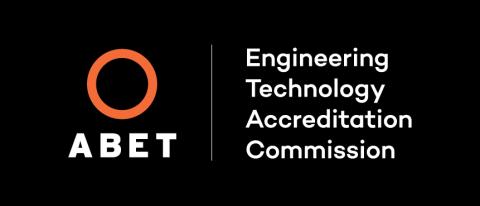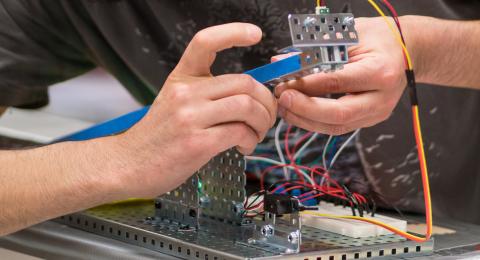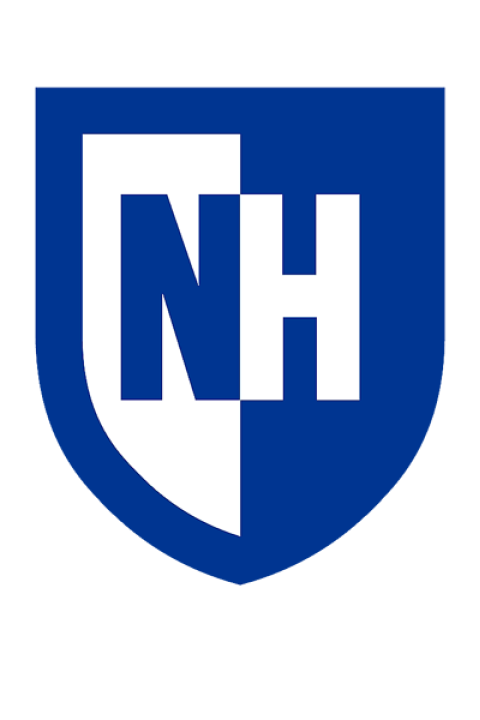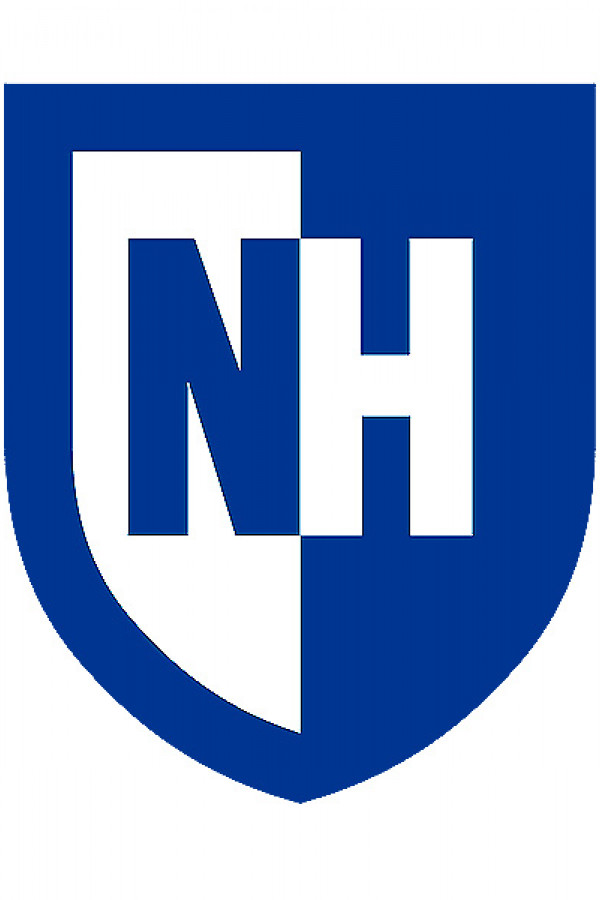Preparing graduates for careers or advanced study in electrical engineering technology
UNH Manchester's offers a four-year electrical engineering technology bachelor’s degree program as well as a 2+2 dual admission program, designed for those who have earned an associate degree at a community college to complete the final two years of a bachelor's degree at UNH Manchester.
What is electrical engineering technology?
Electrical engineering technology prepares students for the dynamic, highly rewarding field of electronic design and development. Students learn the fundamental concepts related to the design, development, testing and modeling of a wide range of electrical systems.
Why study electrical engineering technology at UNH Manchester?
UNH Manchester's ABET-accredited electrical engineering technology program gives students the practical experience to meet their career goals and industry demand. Led by faculty who are industry experts, students apply the theoretical concepts learned in class to hands-on projects in our state-of-the-art laboratories. The senior capstone puts theory into action as students find solutions to real-world technological problems in design, fabrication and testing. Small class sizes mean big opportunities to collaborate with faculty, classmates and industry, preparing students for careers in a variety of industries.
Potential career areas
- Advanced manufacturing
- Aerospace
- Education and research
- Semiconductors and IC design
- Telecommunications
- Transportation and automotive

Bachelor of Science in Engineering Technology with a Major in Electrical Engineering Technology is accredited by the Engineering Technology Accreditation Commission of ABET, under the commission’s General Criteria and Program Criteria for Electrical/Electronic(s) Engineering Technology.
We've partnered with NHTI and Nashua Community College to develop curriculum guides that show you how your associate degree will transition into UNH Manchester's electrical engineering technology program.
Connecticut and Rhode Island do not offer a bachelor's-level electrical engineering technology program in their public universities, so students from these states can enroll in UNH's program at a reduced tuition rate thanks to the New England Board of Higher Education’s Tuition Break program.
Curriculum & Requirements
Engineering technology requires the application of engineering and scientific knowledge and methods combined with technical skills in support of engineering activities. Graduates may work in a variety of areas including engineering design, manufacturing, field service, testing, and sales and may work in management positions related to engineering, manufacturing, and computer technology.
The UNH Manchester BS in Electrical Engineering Technology is accredited by the Engineering Technology Accreditation Commission (ETAC) of ABET, www.abet.org.
The programs at UNH Manchester are designed to meet the needs of both full- and part-time students with a mix of classes scheduled during the day and in the evening.
For more information, contact the Office of Admissions at (603) 641-4150.
This degree plan is a sample and does not reflect the impact of transfer credit or current course offerings. UNH Manchester undergraduate students will develop individual academic plans with their professional advisor during the first year at UNH.
Sample Course Sequence
| First Year | ||
|---|---|---|
| Fall | Credits | |
| ENGL 401 | First-Year Writing | 4 |
| MATH 418 | Analysis and Applications of Functions | 4 |
| COMP 424 | Applied Computing 1: Foundations of Programming | 4 |
| ET 431 | Circuit Analysis I | 4 |
| Credits | 16 | |
| Spring | ||
| PHYS 407 | General Physics I | 4 |
| ET 421 | Digital Electronics I | 4 |
| MATH 425 | Calculus I | 4 |
| ET 432 | Circuit Analysis II | 4 |
| Credits | 16 | |
| Second Year | ||
| Fall | ||
| CHEM 405 | Chemical Principles for Engineers | 4 |
| MATH 426 | Calculus II | 4 |
| ET 522 | Digital Electronics II | 4 |
| ET 541 | Electronic Devices | 4 |
| Credits | 16 | |
| Spring | ||
| ET 542 | Analog Electronics | 4 |
| ET 590 | Embedded Microcontrollers | 4 |
| Discovery Course | 4 | |
| Elective Course | 4 | |
| Credits | 16 | |
| Third Year | ||
| Fall | ||
| ET 671 | Digital Systems | 4 |
| ET 674 | Control Systems and Components | 4 |
| ET 680 | Communications and Fields | 4 |
| Discovery Course | 4 | |
| Credits | 16 | |
| Spring | ||
| ET 625 | Technical Communications | 4 |
| ET 677 | Analog Systems | 4 |
| Discovery Course | 4 | |
| Discovery Course | 4 | |
| Credits | 16 | |
| Fourth Year | ||
| Fall | ||
| COMP 560 | Ethics and the Law in the Digital Age | 4 |
| ET 790 | Microcomputer Technology | 4 |
| ET 791 | Electrical Engineering Technology Project | 4 |
| Discovery Course | 4 | |
| Credits | 16 | |
| Spring | ||
| ECN 411 | Introduction to Macroeconomic Principles | 4 |
| ET 781 | Introduction to Automation Engineering | 4 |
| ET 788 | Introduction to Digital Signal Processing | 4 |
| ET 791 | Electrical Engineering Technology Project | 4 |
| Credits | 16 | |
| Total Credits | 128 | |
Degree Requirements
All Major, Option and Elective Requirements as indicated.
*Major GPA requirements as indicated.
Major Requirements
Each course required in the major must be completed with a minimum grade of C-. Students must attain a minimum GPA in the major of 2.0.
| Code | Title | Credits |
|---|---|---|
| Required Courses | ||
| CHEM 405 | Chemical Principles for Engineers | 4 |
| COMP 424 | Applied Computing 1: Foundations of Programming | 4 |
| COMP 560 | Ethics and the Law in the Digital Age | 4 |
| ECN 411 | Introduction to Macroeconomic Principles | 4 |
| ET 421 | Digital Electronics I | 4 |
| ET 431 | Circuit Analysis I | 4 |
| ET 432 | Circuit Analysis II | 4 |
| ET 522 | Digital Electronics II | 4 |
| ET 541 | Electronic Devices | 4 |
| ET 542 | Analog Electronics | 4 |
| ET 590 | Embedded Microcontrollers | 4 |
| ET 625 | Technical Communications | 4 |
| ET 671 | Digital Systems | 4 |
| ET 674 | Control Systems and Components | 4 |
| ET 677 | Analog Systems | 4 |
| ET 680 | Communications and Fields | 4 |
| ET 781 | Introduction to Automation Engineering | 4 |
| ET 788 | Introduction to Digital Signal Processing | 4 |
| ET 790 | Microcomputer Technology | 4 |
| ET 791 | Electrical Engineering Technology Project (Senior Capstone Project) 1 | 8 |
| MATH 425 | Calculus I | 4 |
| MATH 426 | Calculus II | 4 |
| PHYS 407 | General Physics I | 4 |
| Discovery Program Requirements, Writing Intensive (WI) Requirement, and electives | ||
| Total Credits | 96 | |
- 1
Senior Capstone Project, two semesters; satisfies the Discovery Senior Capstone Experience requirement.
Program Learning Outcomes
Engineering Technology program, the student outcomes must include, but are not limited to, the following learned capabilities:
- An ability to apply knowledge, techniques, skills and modern tools of mathematics, science, engineering, and technology to solve broadly-defined engineering problems appropriate to the discipline;
- An ability to design systems, components, or processes meeting specified needs for broadly-defined engineering problems appropriate to the discipline;
- An ability to apply written, oral, and graphical communication in broadly-defined technical and non-technical environments; and an ability to identify and use appropriate technical literature;
- An ability to conduct standard tests, measurements, and experiments and to analyze and interpret the results to improve processes; and
- An ability to function effectively as a member as well as a leader on technical teams.
Explore Program Details
To earn your Bachelor of Science degree, you’ll complete courses for both the University Discovery Program and your major. Below is an example of what your four-year course sequence in the electrical engineering technology program might look like. Courses are subject to change.
First Year
- ENGL 401 – First-Year Writing
- MATH 418 – Pre-Calculus
- COMP 424 – Applied Computing I: Foundations of Computing
- ET 431 – Circuit Analysis I
- PHYS 401 – Physics I
- ET 421 – Digital Electronics
- MATH 425 – Calculus I
- ET 432 – Circuit Analysis II
Second Year
- MATH 426 – Calculus II
- ET 522 – Digital Electronics II
- ET 541 – Electronic Devices
- Discovery Course
- CHEM 403/405 – Chemistry
- ET 542 – Analog Electronics
- ET 590 – Embedded Microcontrollers
- Discovery Course
Third Year
- ET 671 – Integrated Digital Systems
- ET 680 – Signals and Communications
- ET 790 – Mixed Signal Systems
- Discovery Course
- ET 625 – Technical Communications
- ET 674 – Control Systems and Components
- ET 677 – Integrated Analog Systems
- Discovery Course
Fourth Year
- COMP 560 – Ethics and Law in the Digital Age
- ET 788 – Digital Signal Processing
- ET 791 – EET Capstone
- Discovery Course
- ECN 401 – Economics
- ET 781 – Introduction to Automation Engineering
- ET 791 – EET Capstone
- Discovery Course
-
Associate Professor/Affiliate Associate ProfessorEmail: Michael.Jonas@unh.eduPhone: (603) 641-4352
-
Associate ProfessorChair, Department of Applied Engineering and SciencesEmail: Christopher.LeBlanc@unh.eduPhone: (603) 641-4323
-
Associate ProfessorAssistant Professor, Mechanical Engineering TechnologyEmail: Sean.Tavares@unh.eduPhone: (603) 641-4322
-
Adjunct Faculty
Students who earn an associate degree in mechanical, electronic, robotics and automation, computer or manufacturing engineering technology at NHTI are automatically considered for admission to UNH Manchester's bachelor's degree program in either electrical or mechanical engineering technology, without having to complete a separate application. Students will need to complete and file the Dual Admit/Intent to Release Information forms with the NHTI registrar’s office during the semester they intend to graduate, then the registrar’s office will forward the file to UNH Manchester to process admission.
UNH Manchester's Pathways Program provides a pathway to show you which courses at NHTI will transfer into UNH Manchester's electrical engineering technology program.
See the complete list of Pathways
The Engineering Access Program (EAP) is a cooperative effort of shared resources between UNH Manchester, NHTI and the College of Engineering and Physical Sciences (CEPS) at UNH in Durham. EAP gives students a path to a UNH bachelor of science degree in physics or chemical, civil, electrical or mechanical engineering through a two-stage, articulated transfer process.
UNH Manchester students enter their freshman year as an 'undeclared' bachelor's degree candidate or an Associate in Arts in general studies candidate. During freshman year, most program requirements are completed at the Manchester campus, with potentially some courses at NHTI in Concord. Upon completing all freshman course requirements and satisfying required achievement standards, students can transfer to their desired CEPS program and complete their sophomore, junior and senior years at the university's Durham campus.
- Former UNH students: If you previously held degree status at UNH but did not complete your degree, you will need to complete a separate application for readmission. Please contact UNH Manchester's admissions office for more information, or download the application for readmission.
- International students: Please visit the international student admissions page for more information and to apply.
Questions? Contact an admission counselor for help.
The electrical engineering lab houses 10 uniform stations, each equipped with an oscilloscope, industry-standard CAD software and more to give you the hands-on experience that puts you ahead.
Equipped with vertical and horizontal milling machines, a computer numerical controlled milling machine, a lathe, various saws and a disc sander, the machine shop gives students hands-on skills in mechanical fabrication and testing, better preparing them for high-demand manufacturing roles.
Equipped with electronic workspaces, soldering stations, 3D printers and more, the capstone lab offers creative space for seniors working on their culminating projects.
The electrical engineering technology program prepares graduates with the skills necessary to enter careers in the design, application, installation, manufacturing, operation and/or maintenance of electrical and electronic(s) systems. The Bureau of Labor Statistics anticipates positive growth in many engineering-related professions, projecting more than 12,000 jobs for electrical engineers by 2020. That growing demand translates into high employment rates and starting salaries for EET graduates, giving you the practical skills for an impactful, lucrative career.
In its annual salary survey, the National Association of Colleges and Employers (NACE) shows engineering technology majors earn the top average starting salary among STEM graduates at the bachelor’s degree level.
The engineering technology program at UNH Manchester consistently supports students in their future endeavors. According to the 2020 UNH First Destination Survey report, 96% of engineering technology graduates were employed within six months of graduation, with 100% being satisfied with their post-graduate plans. Additionally, Class of 2020 graduates reported an average starting salary of $66,875. UNH Manchester's engineering technology program directly supports local workforce needs, with 85% of engineering technology 2020 graduates living and working in the state of New Hampshire.
- Barbara Bancroft, NCC
- Shawn Banker, UNH Durham
- JD Bell, EPE Corporation
- Celine Bilodeau, Eversource
- Alex Chretien, Jetboil intern
- Adam Connolly, BAE Systems
- Joseph Cunningham, NHTI
- Oliver Holt, BAE Systems
- Ken Jones, Previously BAE Sys.
- Dave Lamprey, Osram Sylvania
- Christopher Libby, Velcro
- Dave Luneau, Classco Inc.
- Frank Maliski, Kleenline LLC
- Don Marcotte, NCC
- Keith McBrien, GDS Associates
- Jack Olson, Texas Instruments
- Ed Piekiek, Mitre
- Frank Polito, NHTI
- Jeff Setrin, Safran
- Erich Whitney, Mitre
- Olaf Zwickau, USA Balancing
The Engineering Technology program objectives are the skills and abilities graduates are expected to demonstrate during the first few years of employment, which include:
- Achieving employment in an engineering technology-related position with appropriate title and compensation.
- Demonstrating engineering technology-related technical problem-solving skills.
- Functioning effectively in diverse and multidisciplinary teams.
- Communicating effectively with both technical and non-technical audiences.
- Adapting to changes in technology through continuous personal and professional development.
- Being capable of assuming increasing professional responsibility.
- Conducting all professional activities with integrity, and demonstrating a sense of social and environmental responsibility.
Educational outcomes for students in the Engineering Technology program include, but are not limited to, the following learned capabilities:
- An ability to select and apply the knowledge, techniques, skills, and modern tools of the discipline to broadly-defined engineering technology activities;
- An ability to select and apply a knowledge of mathematics, science, engineering, and technology to engineering technology problems that require the application of principles and applied procedures or methodologies;
- An ability to conduct standard tests and measurements; to conduct, analyze, and interpret experiments; and to apply experimental results to improve processes;
- An ability to design systems, components, or processes for broadly-defined engineering technology problems appropriate to program educational objectives;
- An ability to function effectively as a member or leader on a technical team;
- An ability to identify, analyze, and solve broadly-defined engineering technology problems;
- An ability to apply written, oral, and graphical communication in both technical and non-technical environments; and an ability to identify and use appropriate technical literature;
- An understanding of the need for and an ability to engage in self-directed continuing professional development;
- An understanding of and a commitment to address professional and ethical responsibilities including a respect for diversity;
- A knowledge of the impact of engineering technology solutions in a societal and global context; and
- A commitment to quality, timeliness, and continuous improvement.
- The application of circuit analysis and design, computer programming, associated software, analog and digital electronics, and microcomputers, and engineering standards to the building, testing, operation, and maintenance of electrical/electronic(s) systems; and
- The application of natural sciences and mathematics at or above the level of algebra and trigonometry to the building, testing, operation, and maintenance of electrical/electronic systems.
- The ability to analyze, design, and implement one or more of the following: control systems, instrumentation systems, communications systems, computer systems, or power systems;
- The ability to apply project management techniques to electrical/electronic(s) systems; and
- The ability to utilize differential and integral calculus, as a minimum, to characterize the performance of electrical/electronic systems.
Following the annual 2019/20 Engineering Technology Industrial Advisory Board meeting, the following student outcomes will be adopted.
Student outcomes for the Engineering Technology program include, but are not limited to:
- An ability to apply knowledge, techniques, skills and modern tools of mathematics, science, engineering, and technology to solve broadly-defined engineering problems appropriate to the discipline;
- An ability to design systems, components, or processes meeting specified needs for broadly-defined engineering problems appropriate to the discipline;
- An ability to apply written, oral, and graphical communication in broadly-defined technical and non-technical environments; and an ability to identify and use appropriate technical literature;
- An ability to conduct standard tests, measurements, and experiments and to analyze and interpret the results to improve processes; and
- An ability to function effectively as a member as well as a leader on technical teams.
Fall term enrollment figures and degrees conferred in the Electrical Engineering Technology program for the current and preceding four academic years.
|
|
Academic Year |
Enrollment Year |
Total Undergrad |
Total Grad |
Degrees Awarded |
||||||||
|
|
1st |
2nd |
3rd |
4th |
5th |
Associates |
Bachelors |
Masters |
Doctorates |
||||
|
Current |
2018/2019 |
FT |
NA |
NA |
5 |
4 |
NA |
9 |
NA |
0 |
4 |
0 |
0 |
|
Year |
PT |
NA |
NA |
7 |
6 |
NA |
13 |
NA |
|
|
|
||
|
1 |
2017/2018 |
FT |
NA |
NA |
5 |
6 |
NA |
11 |
NA |
0 |
11 |
0 |
0 |
|
|
PT |
NA |
NA |
6 |
7 |
NA |
13 |
NA |
|
|
|
||
|
2 |
2016/2017 |
FT |
NA |
NA |
9 |
5 |
NA |
14 |
NA |
0 |
5 |
0 |
0 |
|
|
PT |
NA |
NA |
6 |
7 |
NA |
13 |
NA |
|
|
|
||
|
3 |
2015/2016 |
FT |
NA |
NA |
5 |
9 |
NA |
14 |
NA |
0 |
10 |
0 |
0 |
|
|
PT |
NA |
NA |
5 |
6 |
NA |
11 |
NA |
|
|
|
||
|
4 |
2014/2015 |
FT |
NA |
NA |
10 |
3 |
NA |
13 |
NA |
0 |
9 |
0 |
0 |
|
|
PT |
NA |
NA |
7 |
7 |
NA |
14 |
NA |
|
|
|
||
FT - full time
PT - part time












